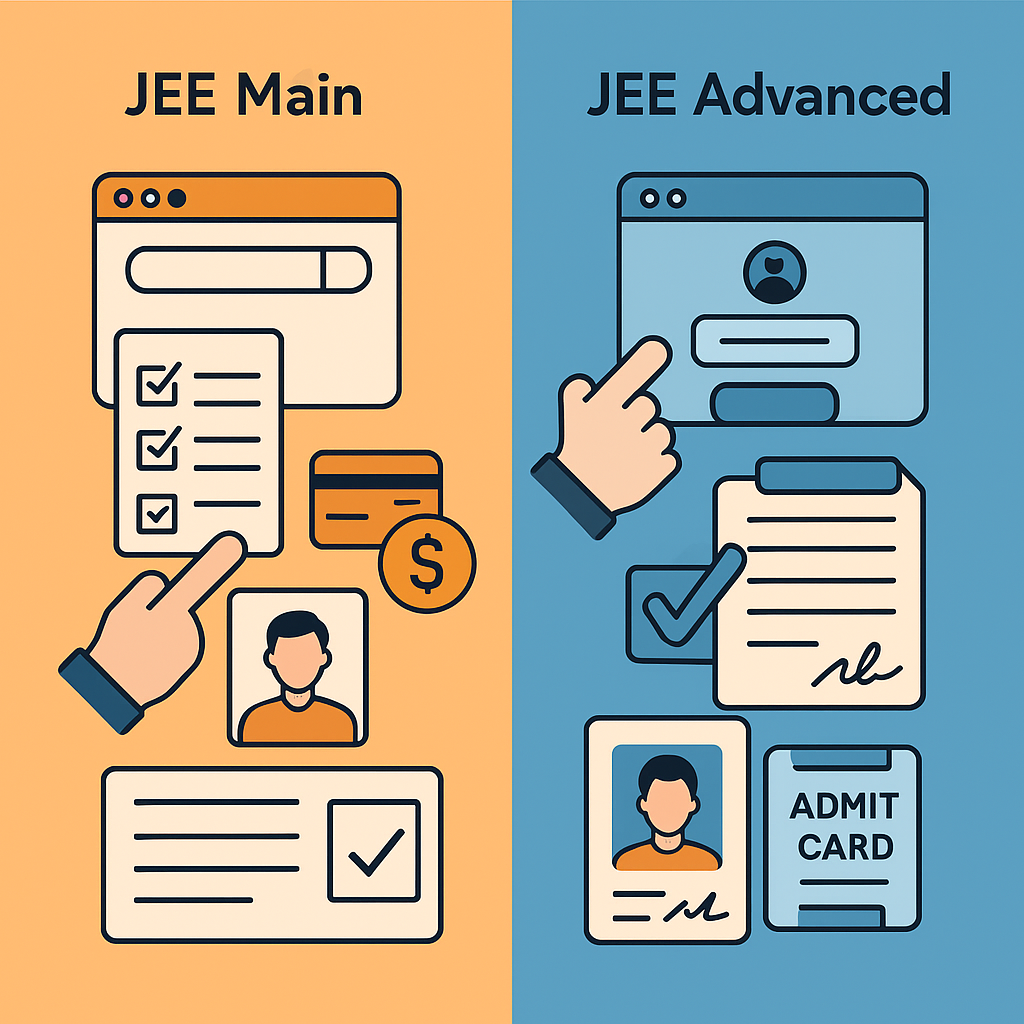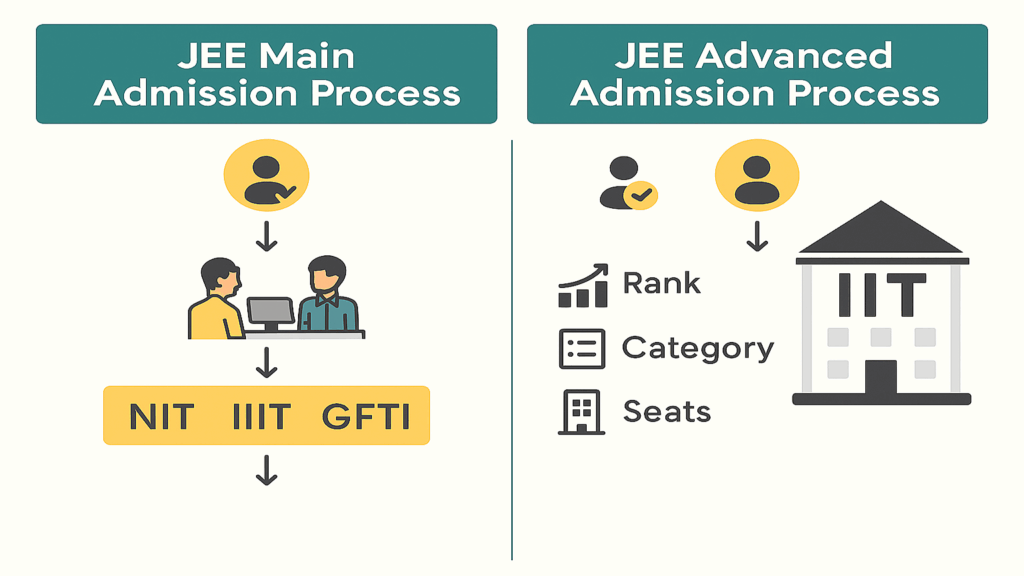One of the most pursued careers in India and annually lakhs of students appear in the Joint Entrance Examination (JEE). It is the most difficult entrance examination in the country as it is the gateway to the best engineering institutes in India.
Most candidates become surrounded by the differences of JEE Main and JEE Advanced. The two exams are associated yet are used differently. The initial step is called JEE Main and is administered by the National Testing Agency (NTA), and the second step is called JEE Advanced and is administered by IITs.
JEE main and advanced differ in terms of difficulty level, eligibility, syllabus, pattern of the exam and chances of admission. By learning these differences, students will be equipped to work in the right direction.
The distinction between JEE Main and Advanced can be discussed by considering the overview of the two exams first.
The National Testing Agency (NTA) conducts JEE Main which is administered several times annually (typically in January and April). It is the qualifying test of JEE Advanced. Admission to NITs, IIITs and other government-funded colleges (GFTIs) is based on scores obtained in JEE Main.
Out of the top 2.5 lakh students in JEE Main, students are given the opportunity to take part in JEE Advanced. In this way, JEE Main functions as a gateway to the best colleges in engineering as well as a filter of Advanced.
One of the IITs conducts JEE Advanced every year, in a rotating manner. Only the students who qualify JEE Main have the privilege to appear in Advanced. This test has been referred to as highly difficult in terms of conceptual depth. The JEE Advanced is used to admit students to the IITs, which are known throughout the world as academic powerhouses and for their research capabilities.
| Feature | JEE Main | JEE Advanced |
|---|---|---|
| Conducted By | NTA | One of the IITs (rotational) |
| Purpose | For NITs, IIITs, GFTIs + gateway to JEE Adv | For IITs only |
| Occurrence | Twice a year | Once a year |
| Number of Papers | Paper 1 (B.E./B.Tech), Paper 2A (B.Arch), Paper 2B (Planning) | Two compulsory papers |
| Difficulty Level | Easy to moderate | Very high (conceptual & application-based) |
The eligibility criteria for JEE Main and Advanced differ, which is a major point of comparison.
| Criteria | JEE Main | JEE Advanced |
|---|---|---|
| Age Limit | No age limit | Age restrictions apply |
| Attempts Allowed | 3 consecutive years | 2 consecutive years |
| Class 12 Passing | 2024, 2025, or appearing in 2026 | Only 2024 or 2025 |
| Requirement | Pass Class 12 with PCM | Clear JEE Main top 2.5 lakh |
Another significant difference that all students need to be aware of before starting to plan their preparation is the number of attempts in JEE Main and JEE Advanced. The two exams provide students with minimal opportunities, and it is this knowledge that helps in setting achievable goals.
Once a candidate passes Class 12, then he or she can take JEE Main three times consecutively.
The JEE Main exam is taken twice a year (usually in January and April session). These two sessions are counted as a single effort in a year, although you may be in both. Suppose you clear Class 12 in 2025, then in 2025, 2026 and 2027 you could take the JEE Main.
JEE Advanced is stricter. You are allowed to appear only two years after passing Class 12.
This implies that when you are taking Class 12 in 2025, you are only eligible to appear in JEE Advanced 2025 and JEE Advanced 2026. Then you are no longer qualified. Furthermore, you also count that year in case you did not show up after passing JEE Main in the first attempt but decided to take JEE Advanced.
.png&w=1920&q=75)
The JEE Main and JEE Advanced exam pattern is very different. JEE Main is more concerned with basic knowledge, whereas JEE Advanced is more concerned with conceptual knowledge, application, and problem solving skills.
Mode of Exam: Computer based online exam (except drawing part in Paper 2).
Paper Options:
Time: 3 hours (4 hours when there are PwD candidates).
Marking: +4 right answers, -1 wrong answers on MCQs.
| Subject | No. of Questions | Marks |
|---|---|---|
| Physics | 30 | 100 |
| Chemistry | 30 | 100 |
| Mathematics | 30 | 100 |
| Total | 90 | 300 |
The question forms can be:
The JEE Main and JEE Advanced syllabus are closely related due to the fact that they are covered by the Class 11 and 12 NCERT syllabus.
The JEE Main syllabus is directly aligned with the NCERT books. It covers basic to moderately difficult concepts:
The JEE Advanced syllabus is more exhaustive. While it includes the same base topics, the questions require:
Topics like 3D Geometry, Advanced Mechanics, Complex Numbers, Differential Calculus, and Electrochemistry are tested with more difficulty here.
| Subject | JEE Main | JEE Advanced |
|---|---|---|
| Physics | Fundamental NCERT-level topics | In-depth application, derivations |
| Chemistry | Inorganic + Organic from NCERT | More focus on problem-solving & reactions |
| Mathematics | Standard NCERT problems (algebra/calculus) | Tougher questions, higher-order thinking |

The registration process for JEE Main and JEE Advanced is different.
JEE Main is very easy to register and because it is held in several sessions, students have the choice of attempts.
JEE Advanced registration is more selective as a small number of students are eligible every year.
| Step | JEE Main Registration | JEE Advanced Registration |
|---|---|---|
| Who Can Apply | Any student fulfilling eligibility | Only top 2.5 lakh JEE Main scorers |
| Conducted By | NTA | Organizing IIT |
| Frequency | Two times a year | Once a year |

Admission via JEE Main and Advanced also differs depending on the type of institutes:
Successful students are then subjected to JoSAA counselling.
The seat allocation is done according to All India Rank (AIR), preferences and category.
JEE Main scores are used by:
Main scores are also accepted in some of the privately-run engineering colleges.
Those students who clear JEE Advanced also attend JoSAA Counselling.
But the allocation of seats here is limited to IITs.
Admission depends on:
| Exam | Admission Institutes | Counselling Authority |
|---|---|---|
| JEE Main | NITs, IIITs, GFTIs, private colleges | JoSAA |
| JEE Advanced | IITs only | JoSAA |
Top Engineering Colleges in India 2025







Articles recommended for you

CUET PG

college

college

college

college

college

college

college

college

college
Chat with us